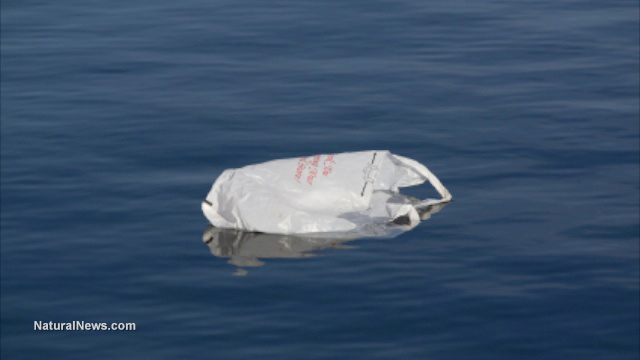California becomes first U.S. state to ban plastic bags
Wednesday, November 23, 2016 by: Daniel Barker
Tags: plastic bags, banned, California

(NaturalNews) A statewide ban against single-use plastic bags has now gone into effect in California, after voters approved Proposition 67, a measure upholding a previous ban approved in 2014.
Plastics industry interests hoped that voters would defeat the ban, but it narrowly passed – making California the first state to enact such a law. The original ban – state Senate Bill 270 – was signed into law by Gov. Jerry Brown in 2014, but was put on hold awaiting voter approval.
The new rules went into effect immediately after the November ballot. From The San Diego Union-Tribune:
"The restrictions apply to large food retailers, pharmacies, corner markets and liquor stores but not restaurants or department stores.
"Businesses can still offer paper bags and thicker plastic bags as long as they charge at least 10 cents for each of those items — a move crafted to encourage folks to tote their own reusable sacks."
Californians pass measure despite plastic industry spending on ballot campaign
The plastics industry pushed for the referendum, with mostly out-of-state industry groups spending $6.1 million in efforts to defeat the measure – compared to $1.6 million spent by environmental groups in campaigns to uphold the ban.Another industry-backed proposal which would have used profits from new bag sales to finance a state environmental fund was defeated in the ballot.
Environmentalists see the results as a decisive victory. Californians Against Waste executive director Mark Murray said:
"This is a huge win that goes way beyond plastic bags. This makes a strong statement in terms of (sending) a signal to polluters that might be eyeing to overturn other California environmental laws."
Referring to the effect the California ban may have on other states such as New York, Massachusetts and Washington, which are considering similar measures, Murray said: "We didn't pick this fight, but honestly, having an affirmative vote of the public on this policy is pretty profound in terms of sending a message across the country."
Plastics industry representatives say that the ban will place an unnecessary burden on low-income consumers and will do little to reduce pollution overall.
Plastic bags: an environmental disaster
But supporters of the ban believe that the law will make a big difference. Californians previously used around 13 billion plastic bags yearly, many of which ended up polluting cities, waterways and beaches. Plastic bags are usually among the five most common types of debris found on California beaches.Whales, turtles and other sea animals are prone to swallowing plastic bags found floating in the ocean – an estimated 100,000 sea turtles and other marine creatures die each year worldwide from either ingesting or being strangled by plastic bags.
It takes as much as 100 million barrels of oil to produce a year's worth of plastic bags for worldwide use, and it takes at least 400 years for a plastic bag to biodegrade. As many as 1 trillion plastic bags are used each year worldwide.
Even though it takes hundreds of years for plastic bags to fully biodegrade, environmentalists say that plastic bags that come into contact with water never fully break down, but instead turn into a "plastic dust" containing biotoxin compounds called polychlorinated biphenyls, or PCBs.
PCBs enter the food chain where they are eventually consumed by humans. They can cause cancer, and damage the nervous and immune systems.
Plastic bags clog drains, leading to flooding problems. They lead to the accumulation of vast floating garbage patches in the ocean.
Plastic bags are dangerous, unsightly, environmentally-unfriendly and unnecessary. California has set an example for the nation and, indeed, the world to follow. It's an easy way to tackle one of the big problems we have tended to ignore in our wasteful, throwaway society.
Sources:
TrueActivist.com
SanDiegoUnionTribune.com
DailyMail.com
LiveStrong.com
LiveStrong.com
Plastic bags at FETCH.news
Get independent news alerts on natural cures, food lab tests, cannabis medicine, science, robotics, drones, privacy and more.
Take Action: Support Natural News by linking to this article from your website
Permalink to this article:
Embed article link: (copy HTML code below):
Reprinting this article:
Non-commercial use OK, cite NaturalNews.com with clickable link.
Follow Natural News on Facebook, Twitter, Google Plus, and Pinterest
- European Court of Justice: Healthcare professionals who promoted or administered COVID-19 vaccines are CRIMINALLY LIABLE for any harm caused
- “Old Man in a Chair”: The COVID-19 pandemic was a carefully orchestrated scheme for global control
- Cinnamon plays a critical role in diabetes management
- Scientists unveil breakthrough method to eliminate "Forever Chemicals" from water, transforming waste into graphene
- FRAUD ALERT: Details DEMOCRATS do NOT want you to know about the $40 BILLION wasted on Fed-loaded credit cards cancelled by DOGE
- Massive egg substitution recall: Bleach contamination sparks nationwide concern
- Newly released JFK files reveal Pentagon's role in creating Lyme disease and covid in the same lab
- Postcard from 1875 highlights smallpox vaccine’s failure: Lessons for today’s COVID-19 response
- DOGE finds evidence of Social Security fraud and illegal immigrant voter registration
- AI-powered forecasting model proves more accurate than traditional systems at predicting the weather
- Zelensky defies Trump, rejects U.S. aid repayment and mineral deal amid rising tensions
- World Health Organization in crisis, prepares for DOWNSIZING after U.S. withdrawal and funding problems
- Preparing for the unthinkable with William Brocius’ “How to Survive the Death of the Dollar”
- Trump administration deploys spy satellites to enhance southern border surveillance
- Pentagon memo suggests U.S. will not defend Europe from Russian aggression, prioritizing China and homeland security
- Oncologist warns of ‘terrifyingly aggressive’ cancers in children, linked to immune suppression from COVID vaccines
- Science proves PASSION FRUIT is a powerful medicine for the GUT and the HEART
- Israel's war on Gaza's healthcare: Over 1,400 medical workers killed in attacks
- Newly released JFK files reveal Pentagon's role in creating Lyme disease and covid in the same lab
- CDC finally halts $11 billion COVID funding scam as health officials admit the ‘pandemic’ was a fraud
- Analysis: The coming economic collapse, a mass uprising and Trump's three secret weapons to halt the growing revolt
- Kiss Your Genetic Privacy Good-Bye! 23andMe Gets Green Light to Sell Your Intimate Genetic Details to Anyone They Want
- Dr. Suzanne Humphries makes bombshell appearance on Joe Rogan podcast, exposing vaccine industry deception back to POLIOMYELITIS
- DEADLY DECEPTION: How COVID vaccines increased mortality rates and why authorities hid the truth
- Woman contracts WORLD'S DEADLIEST VIRUS after unknowingly being given the WRONG VACCINE
- Oncologist warns of ‘terrifyingly aggressive’ cancers in children, linked to immune suppression from COVID vaccines
- Here are TEN all-natural ways to protect your garden without using harmful chemicals
- Black cumin seed oil emerges as a powerful ally against breast cancer and chronic inflammation
- The hidden dangers in your kitchen: How cooking methods impact diabetes, cancer and aging
- Trump's greatest betrayal so far: Accelerating Middle East wars, silencing dissent, and serving Zionist masters
- Senate Democrats deny censorship industrial complex existed, defend government's role in silencing dissent
- Sugar-free deception: Artificial sweeteners hijack hunger signals, fuel obesity epidemic, study warns
- “Independent” anti-Russia outlet MEDUZA faces COLLAPSE as US funding dries up
- NIH study, buried for decades, reveals that Flu Shots INCREASE elderly deaths, not prevent them
- The Health Ranger releases “Vaccine Zombie” song and music video, using AI-animated zombies for the music video
- Discovery of vast underground city beneath Giza pyramids challenges human history
- Newly released JFK files reveal Pentagon's role in creating Lyme disease and covid in the same lab
- California's social media censorship law struck down: A victory for free speech or a threat to online safety?
- EPA advisor admits the agency is funneling billions to climate groups ahead of Trump’s return to White House
- The Health Ranger releases “Vaccine Zombie” song and music video, using AI-animated zombies for the music video
- Dr. Mike Yeadon releases 15-minute testimony - WATCH - about genocidal intent of COVID “vaccines”
- Florida takes a stand: DeSantis proposes permanent ban on mRNA vaccine mandates
- Mike Adams releases country western hit single: Goin’ Back in Time is Comin’ Home
- “Why we influenced the 2020 elections”: Facebook files reveal the coordinated effort to bury the Hunter Biden laptop story
- Unpacking the Lies That We’ve Been Fed – new song and music video released by Mike Adams, the Health Ranger
- House Intelligence Committee calls for the ARREST and PROSECUTION of Dr. Anthony Fauci
- The pandemic as a tool for INDOCTRINATION: Understanding “The Indoctrinated Brain” by Dr. Michael Nehls
- Rep. Nancy Mace introduces bill to ban biological males from female facilities on federal property
- Mike Adams releases music poetry sensation: A Child of God
- Sugarcane extract superior to cholesterol-lowering drugs?
- Survival 101: Effective EMF blocking techniques
- Michigan sheriff announces criminal investigation into 2020 election crimes, Dominion Voting Systems
- Peter Rost exposes Big Pharma corruption in his book “The Whistleblower: Confessions of a Healthcare Hitman”
- Migrants are taking advantage of recent hurricanes to scam residents and loot their homes
- Red Cross issues warning to stop blood plasma donations from vaccinated people
- Scientists confirm: GENIUS brain function can be spontaneously unleashed in humans without any apparent cause
- EPA advisor admits the agency is funneling billions to climate groups ahead of Trump’s return to White House
- HYSSOP: What research reveals about the health benefits of this ancient holy herb
- Two containers with completed ballots fall out of truck in Florida
- Fully vaccinated about to see “tsunami” of illness and death, warns virologist
- Global leaders unite to clamp down on “misinformation” with UN-backed Cascais Declaration
- BREAKING: 2025 NDAA authorizes mandatory military draft of WOMEN across America… as Pentagon pursues global NUCLEAR war with both Russia and China at the same time
- Michael Yon warns of a ZIONIST TAKEOVER in Trump’s second administration
- BOMBSHELL: DNA testing kits are a SCAM to develop ethnic-specific bioweapons
- Ozempic and Wegovy weight loss drugs are injectable LIZARD VENOM PEPTIDES that may unleash a devastating wave of organ failure… side effects align with symptoms of SNAKE BITES
- Israeli soldiers accused of even more torture and abuse in the West Bank
- These 13 countries just signed an agreement to engineer a global FAMINE by destroying food supply
- NASA admits that climate change occurs because of changes in Earth’s solar orbit, and NOT because of SUVs and fossil fuels
- RFK Jr. clears key hurdle: Sen. Susan Collins backs controversial HHS nominee, signaling a new era for health policy
- Sermon 30: How Jesus reveals Caesar’s FAKE CURRENCY and FALSE AUTHORITY
- Coriander seeds: Ancient medicine backed by modern science
- Arizona officials claim Maricopa County needs 10-13 days to tabulate results of the election
Science News & Studies
Medicine News and Information
Food News & Studies
Health News & Studies
Herbs News & Information
Pollution News & Studies
Cancer News & Studies
Climate News & Studies
Survival News & Information
Gear News & Information
News covering technology, stocks, hackers, and more



"Big Tech and mainstream media are constantly trying to silence the independent voices that dare to bring you the truth about toxic food ingredients, dangerous medications and the failed, fraudulent science of the profit-driven medical establishment.
Email is one of the best ways to make sure you stay informed, without the censorship of the tech giants (Google, Apple, Facebook, Twitter, YouTube, etc.). Stay informed and you'll even likely learn information that may help save your own life."
–The Health Ranger, Mike Adams












































